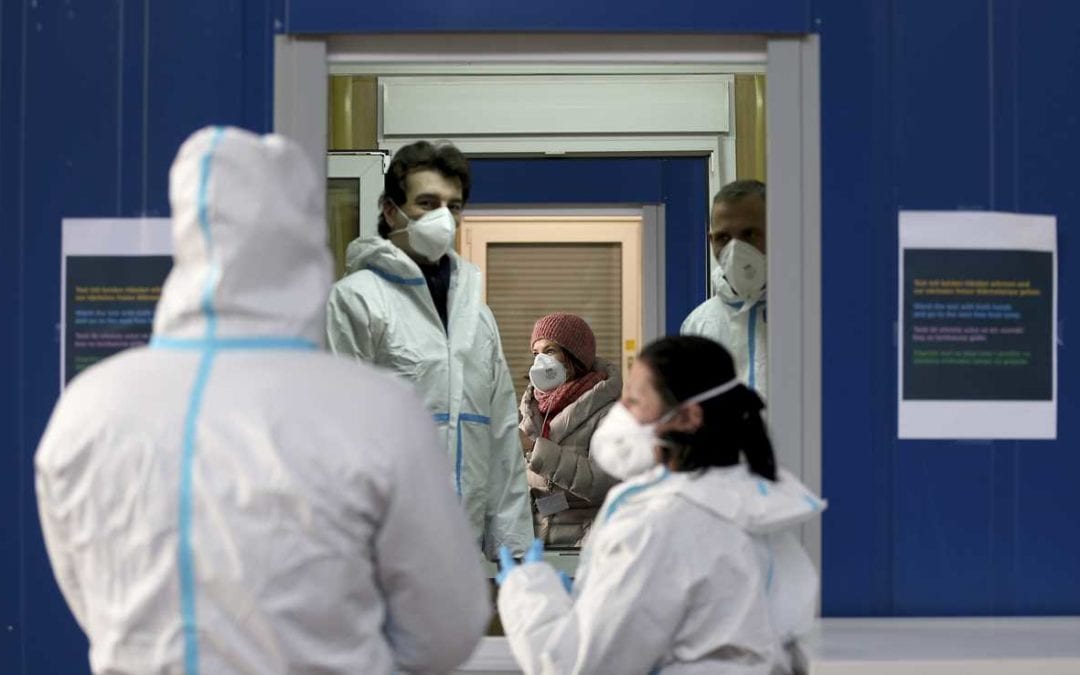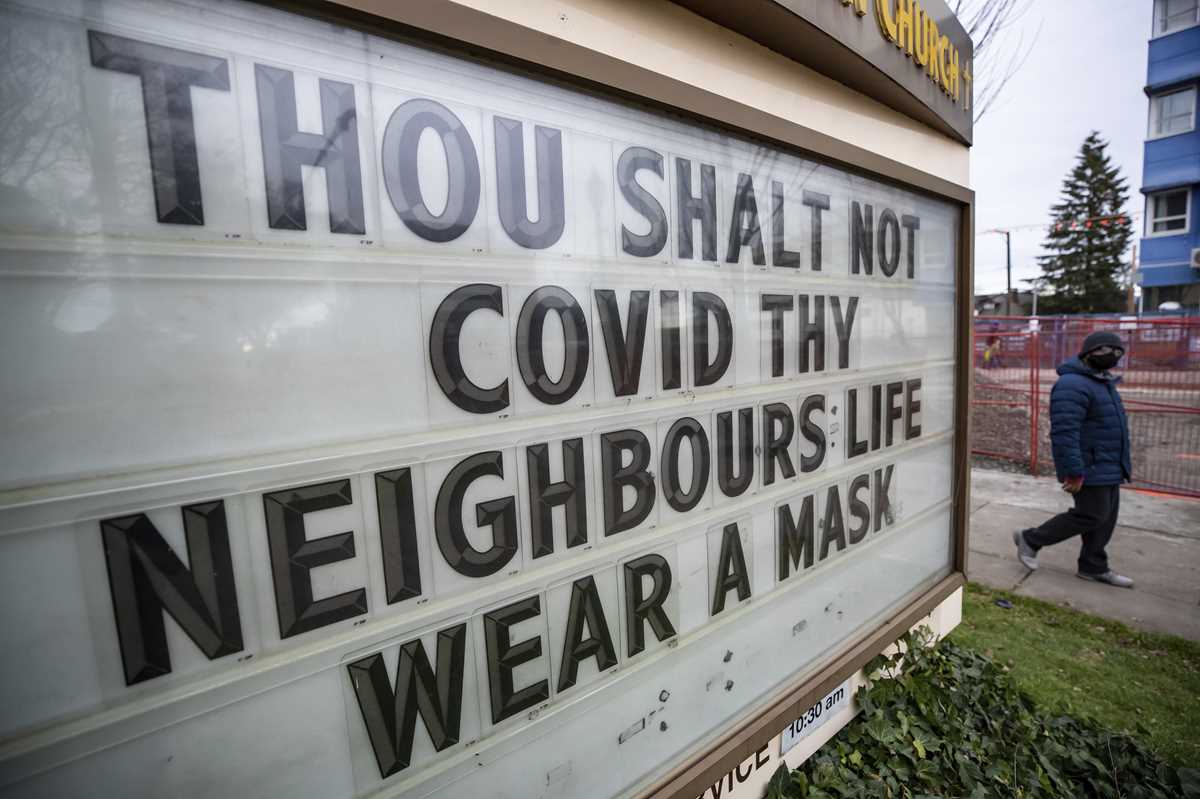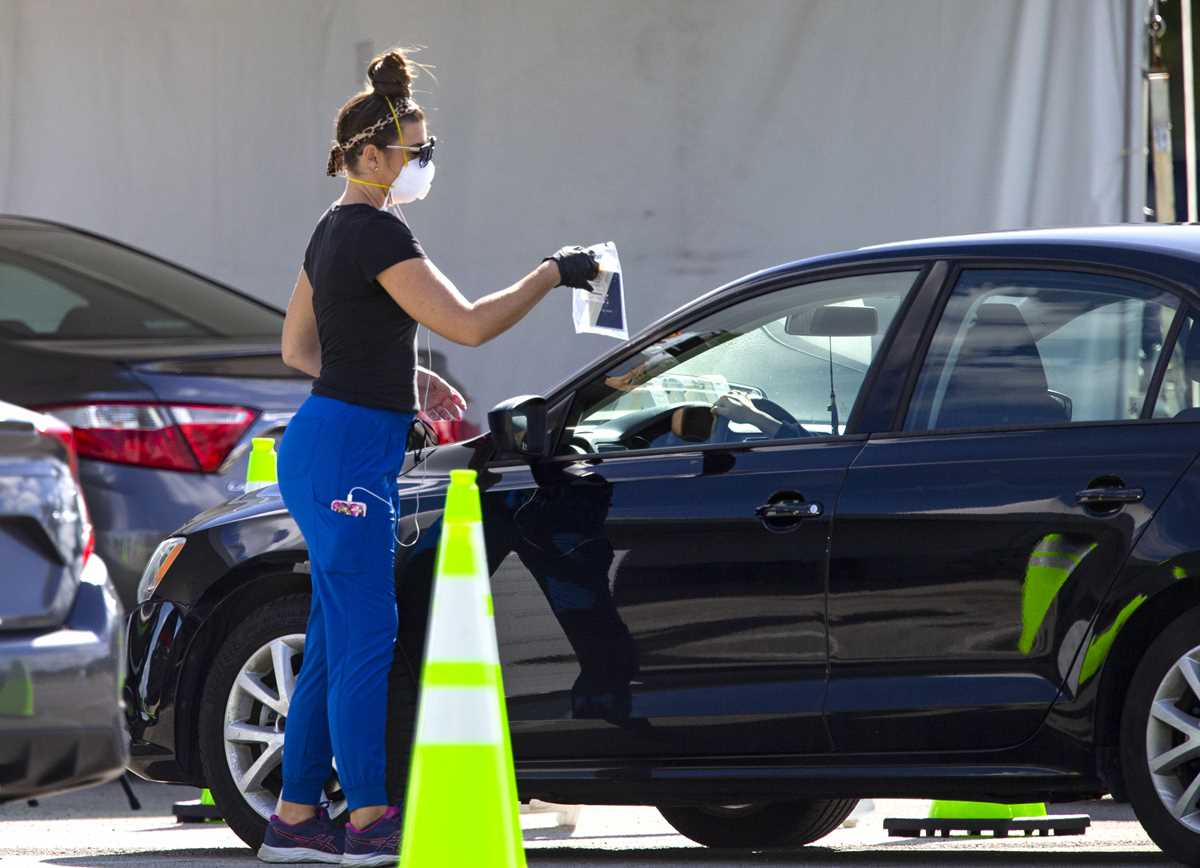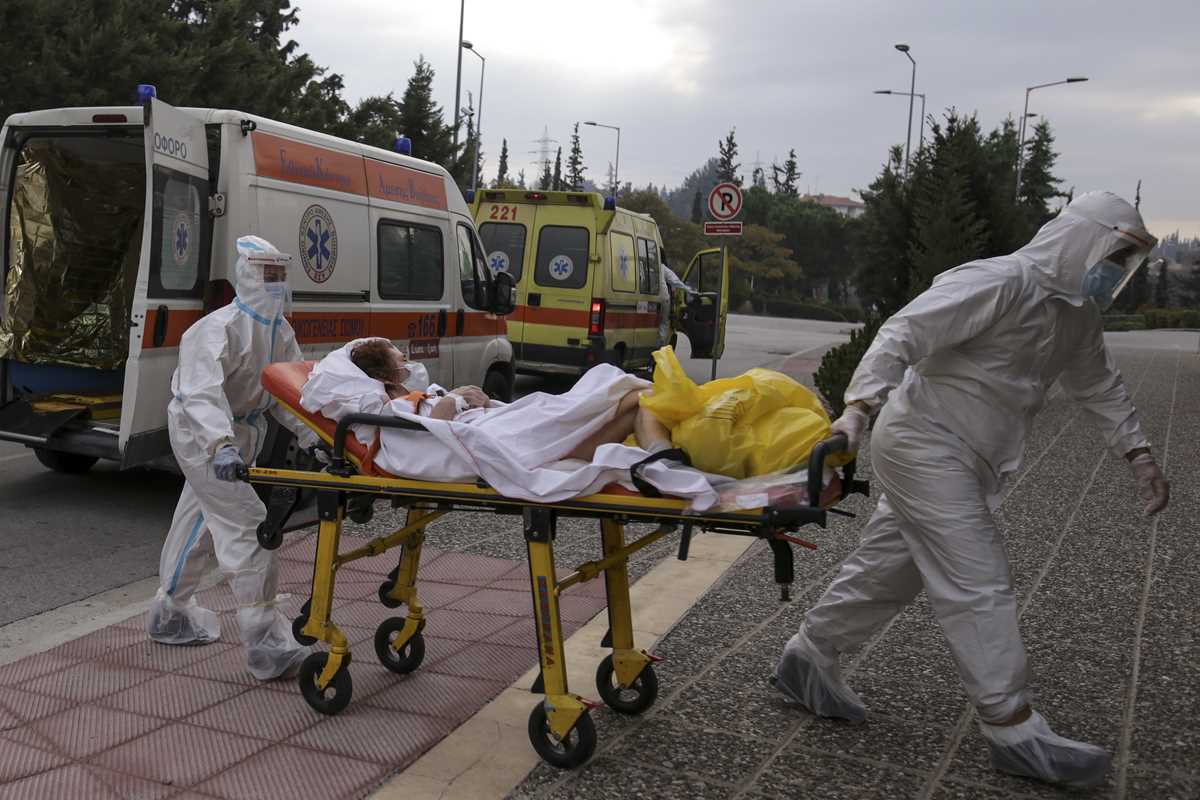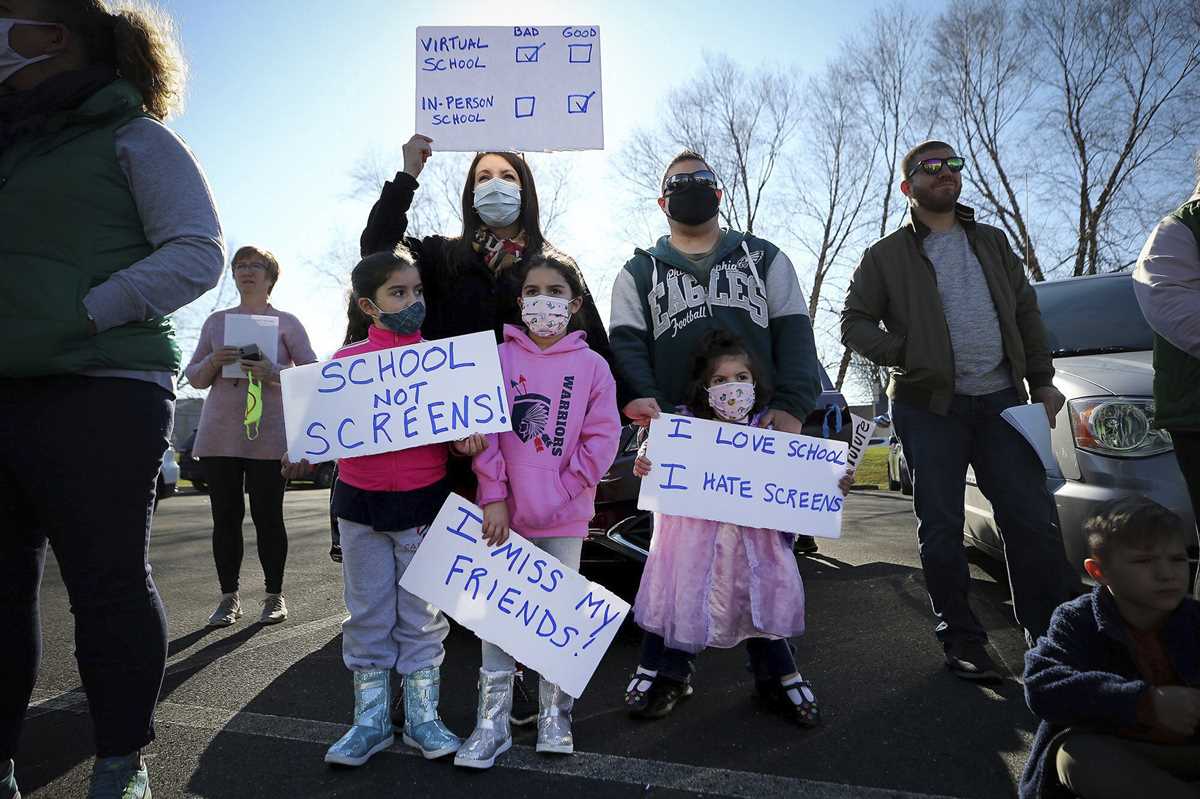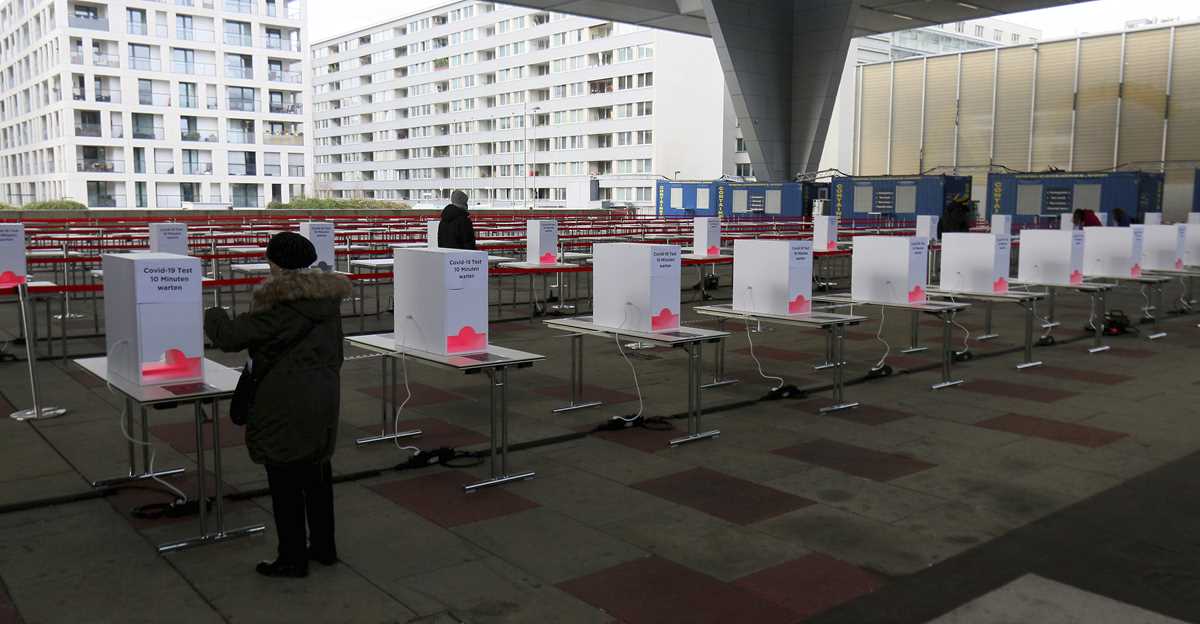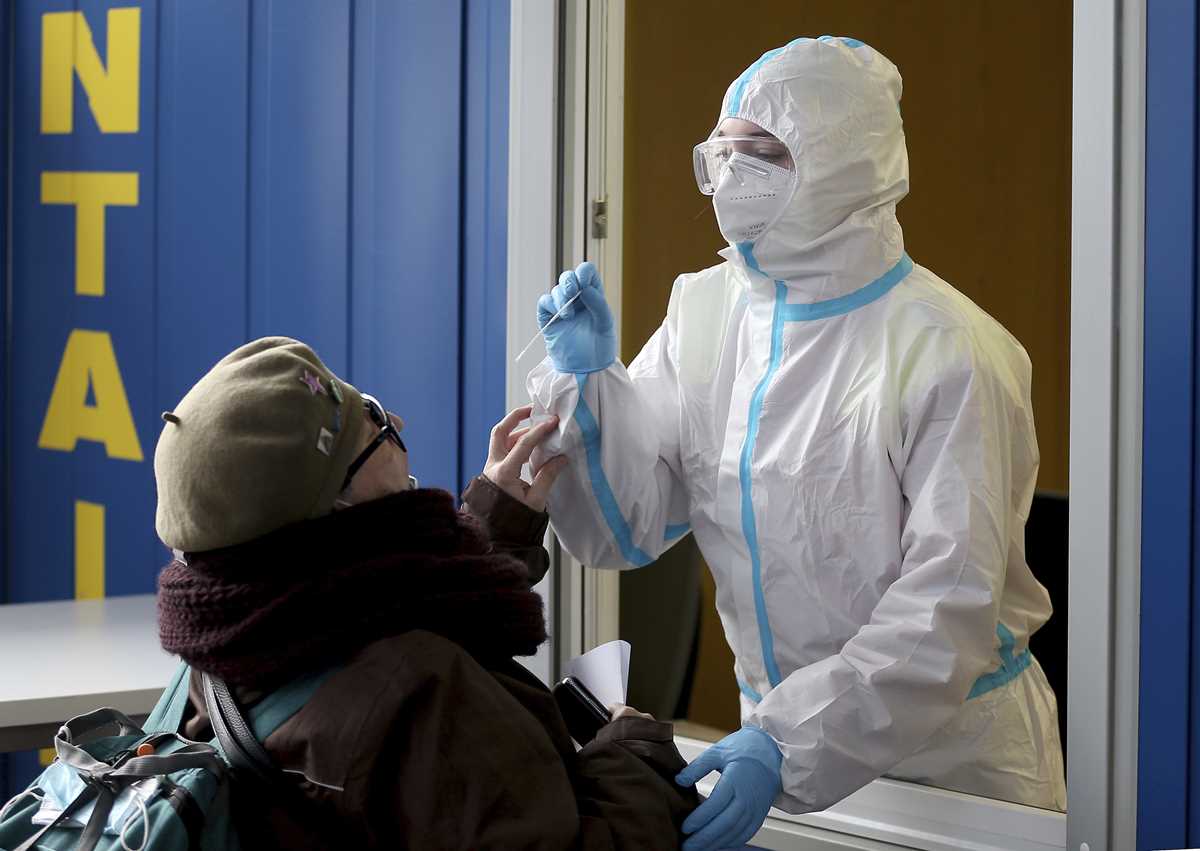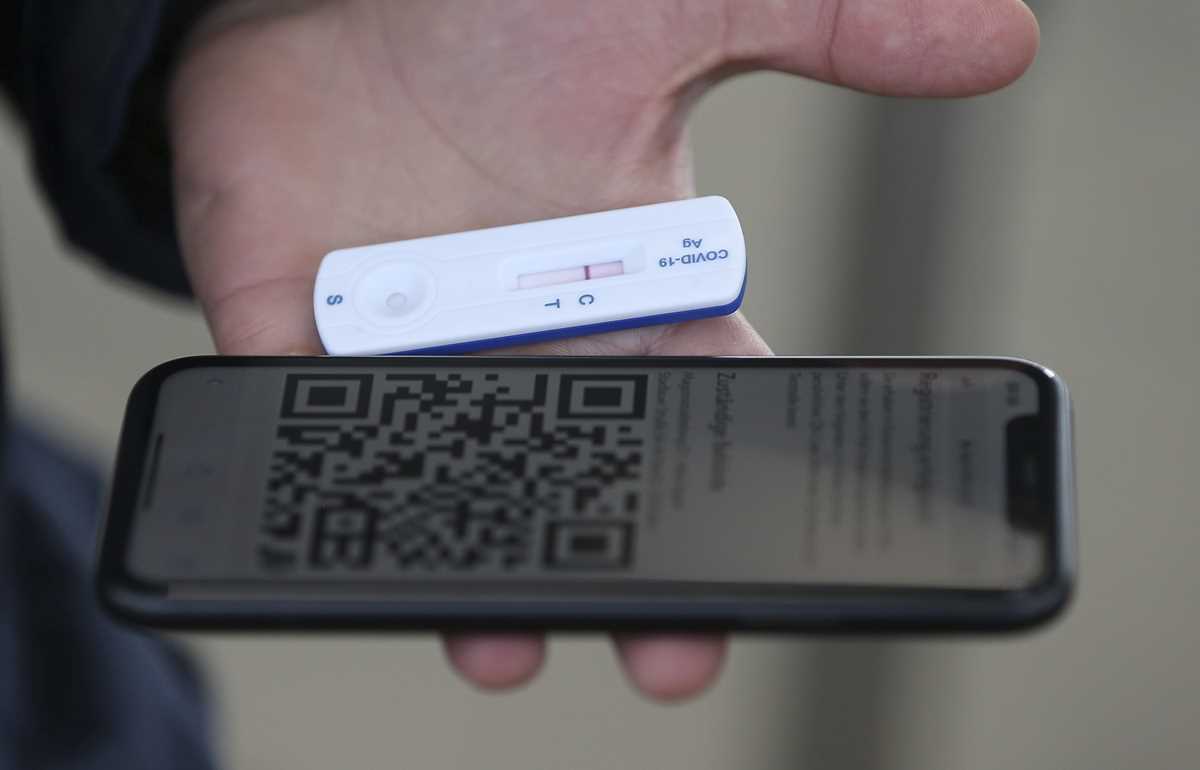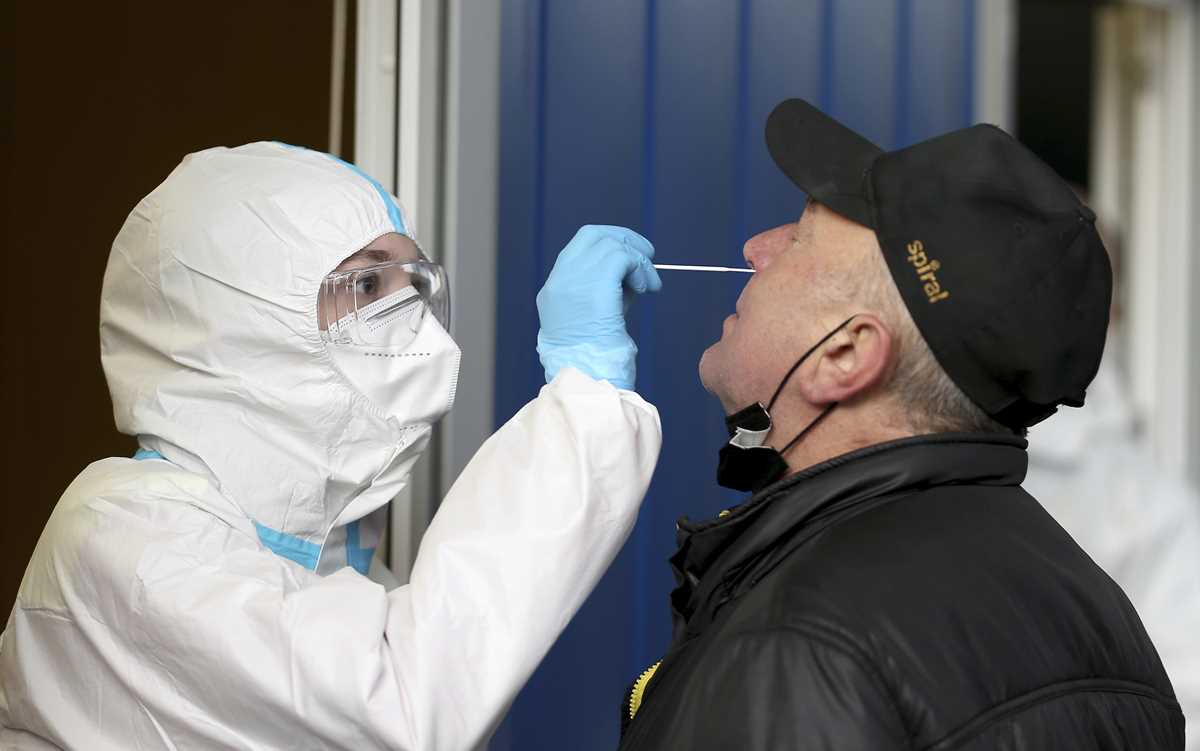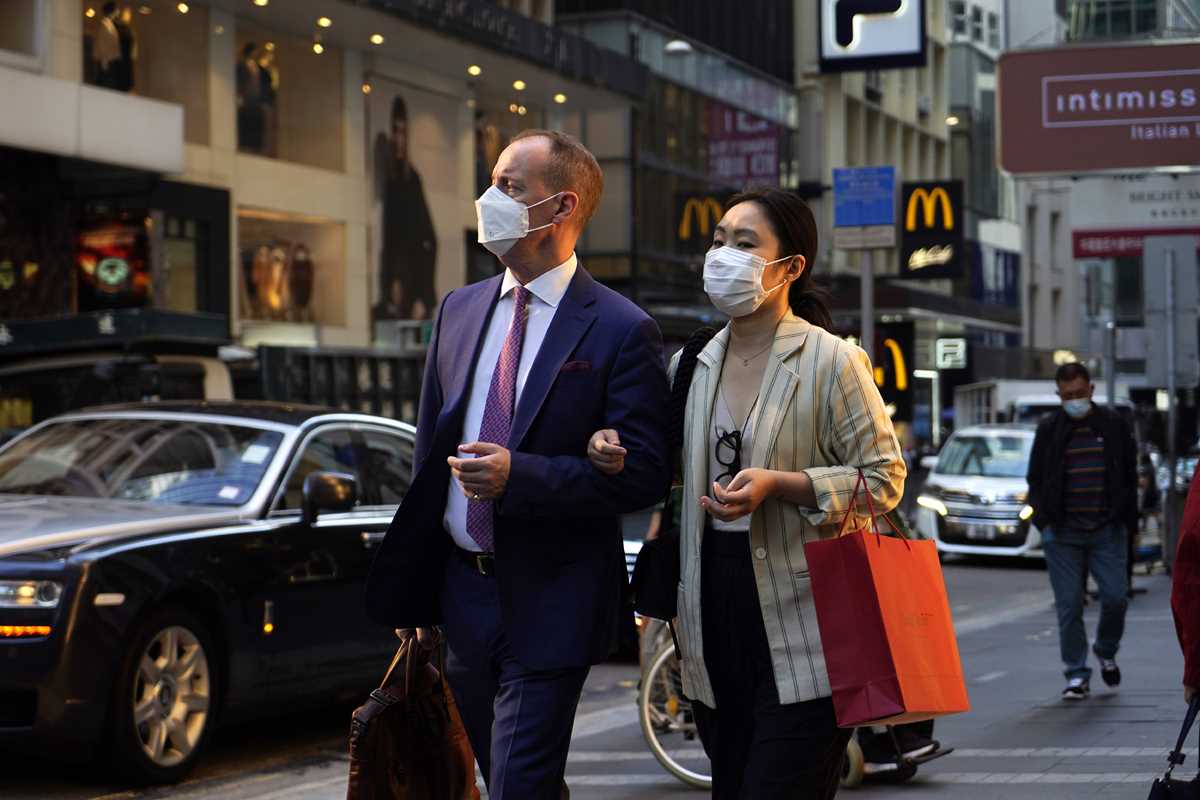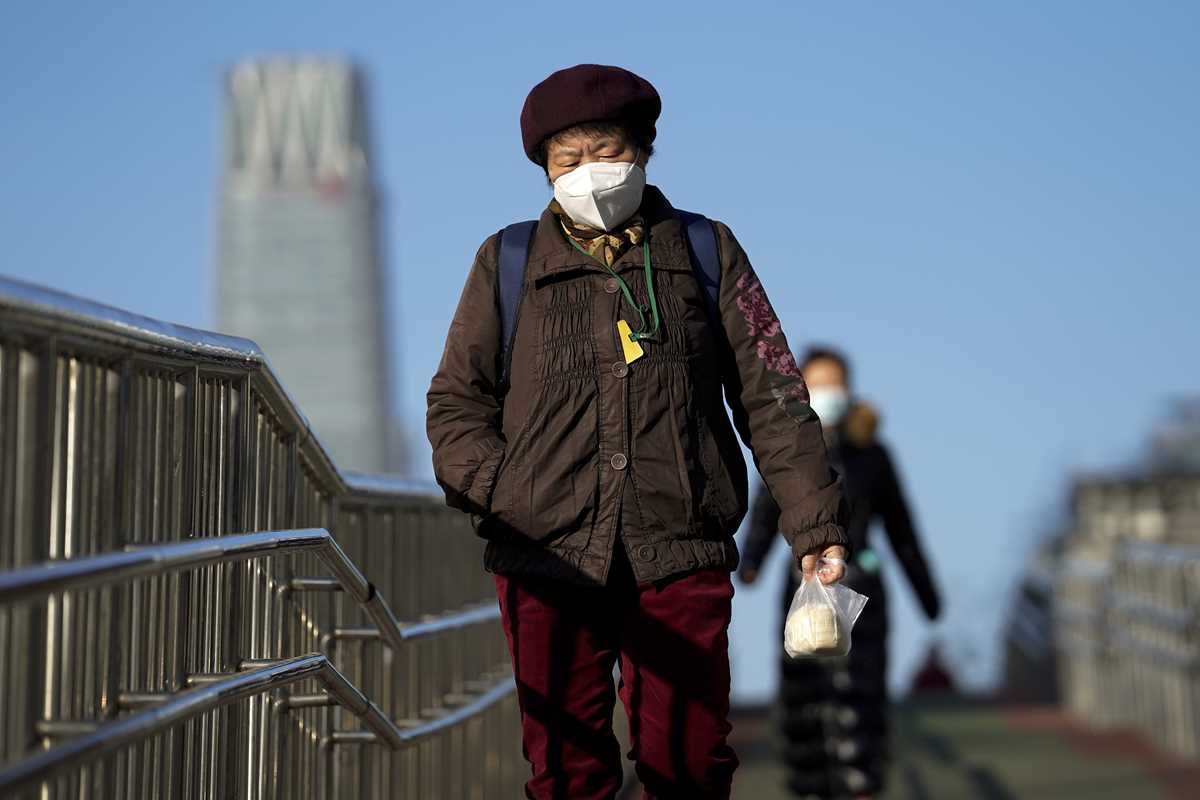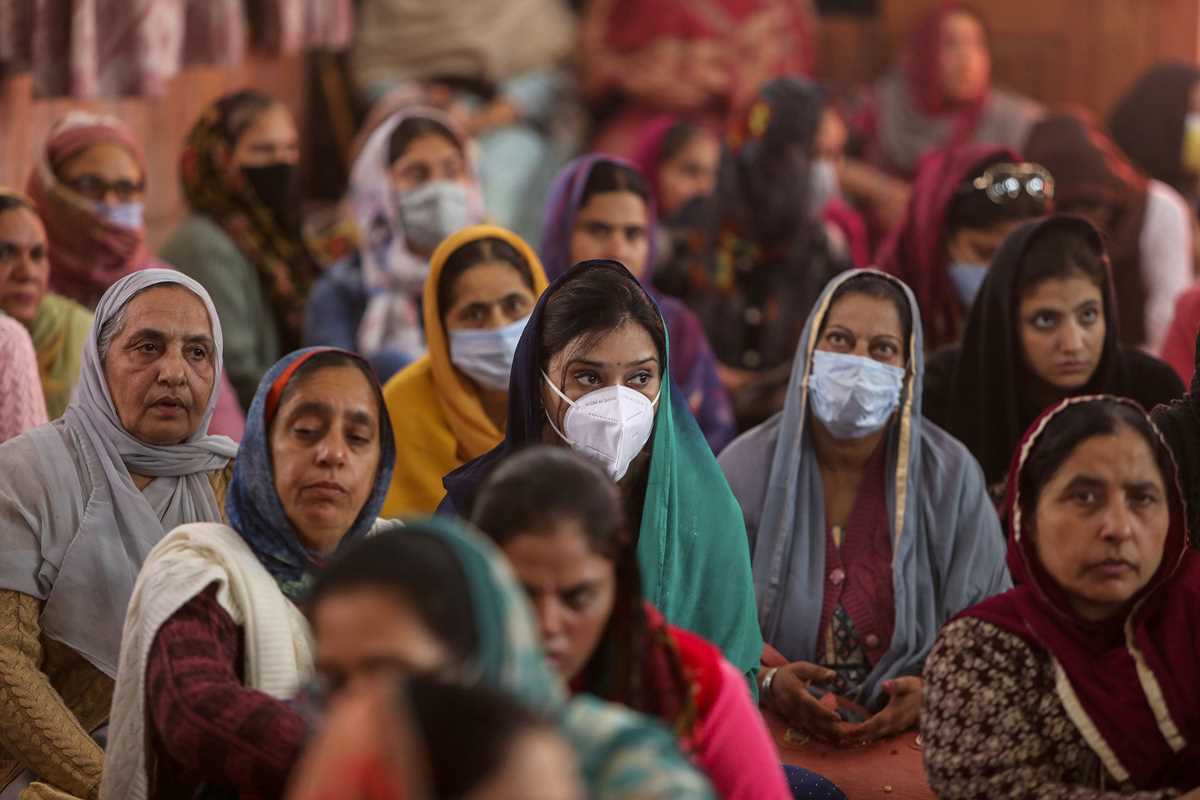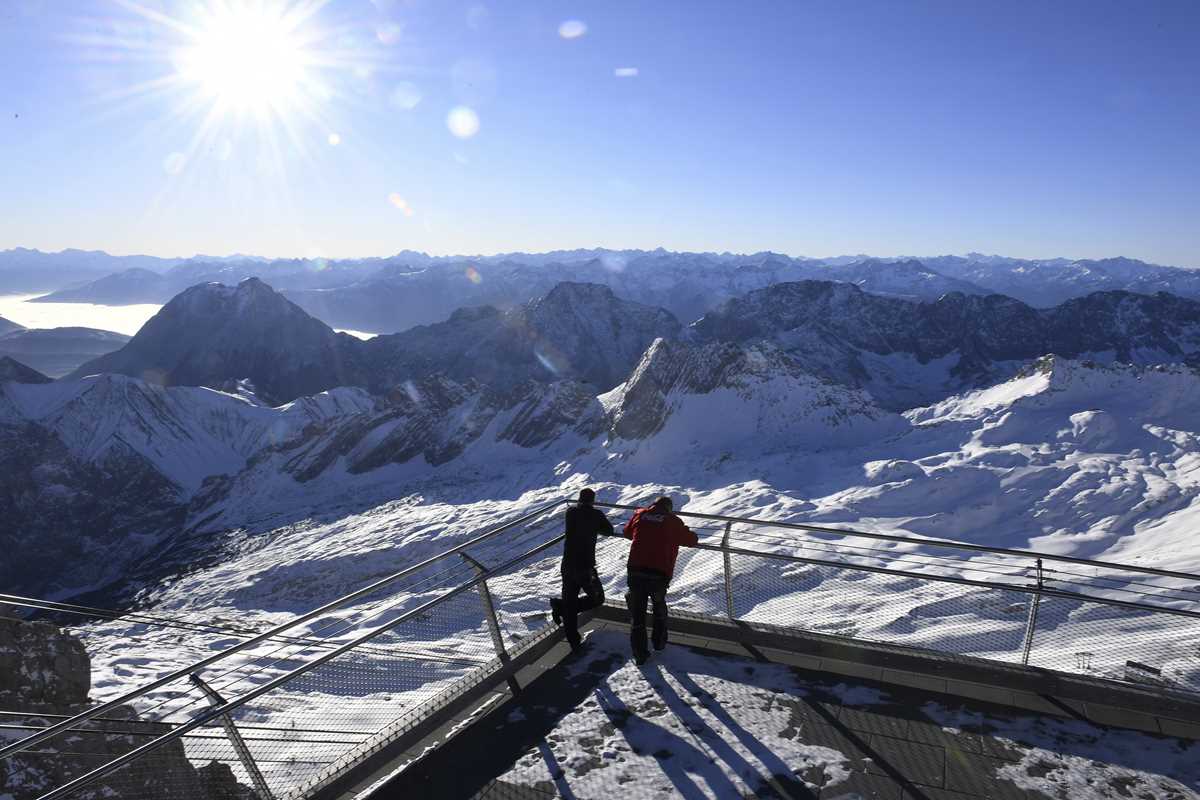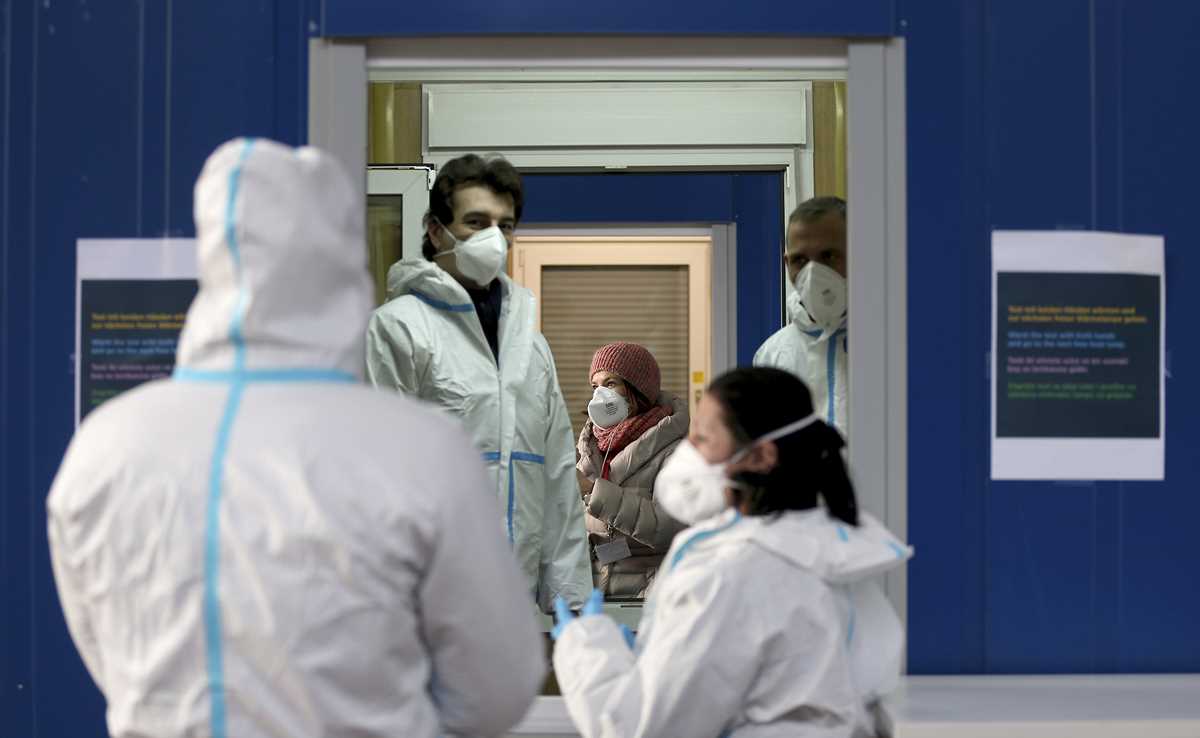
A medical workers works in a COVID-19 set up for rapid new coronavirus testing in Vienna, Austria, Monday, Nov. 30, 2020. The Austrian government has moved to restrict freedom of movement for people, in an effort to slow the onset of the COVID-19 disease and the spread of the coronavirus. (AP Photo/Ronald Zak)
DENVER — Citing Congress’ failure to pass a new coronavirus economic relief package, Colorado’s Democrat-led Legislature convened on Monday in a special session called by Gov. Jared Polis to pass bills offering sales tax relief and state grants to small businesses, tenants and public school districts affected by the pandemic.
Over the weekend, Democratic lawmakers unveiled bills offering a combined $280 million to help small firms through the winter; sustain child care facilities; deliver rental and mortgage aid for landlords and tenants; and boost food pantry stocks.
The proposals also cover fortifying broadband and internet access for public school teachers and students; helping residents pay utility bills; and a $100 million transfer by the state for COVID-related public health expenses.
Lawmakers also are considering legislation to allow restaurants, bars and food trucks to keep state sales tax collections they otherwise would have to remit to the state, at least through February.
THE VIRUS OUTBREAK:
— Moderna asking US, European regulators to OK its virus shots
— Fauci: US may see ‘surge upon surge’ of virus in coming weeks after Thanksgiving travel
— U.K. stocks up on vaccines, hopes to start virus shots within days
— Virus forces businesses to adapt or close down on the streets of London
— New York City to reopen its schools to in-person learning, tests students more for COVID-19
Follow AP’s coverage at https://apnews.com/hub/coronavirus-pandemic and https://apnews.com/UnderstandingtheOutbreak
HERE’S WHAT ELSE IS HAPPENING:
OLYMPIA, Wash. — Washington state is launching its statewide coronavirus exposure app, joining more than a dozen other states that have already enlisted the use of smartphone technology in the ongoing effort to prevent the spread of COVID-19.
Starting Monday, people with iPhones can enable the ‘exposure notifications’ feature that is already in their phone’s settings, and Android devices can download the app.
Use of the app is voluntary and users can opt out at any time. The statewide expansion comes after a monthlong pilot project at the University of Washington.
The technology, created by Apple and Google, is in use in more than 30 countries and more than a dozen states in the U.S.
Washington was among five states with pilot programs already testing the technology.
GENEVA — As several European countries have suspended access to the ski slopes to stop the spread of the coronavirus pandemic, the World Health Organization’s emergencies chief said the risk of catching COVID-19 while skiing is likely minimal.
“I suspect many people won’t be infected barreling down the slopes on their skis,” said Dr. Michael Ryan at a WHO news briefing on Monday.
The U.N. health agency has said the virus transmits much less readily outside because it is dispersed in the fresh air. Restrictions to slow the spread of COVID-19 have kept ski lifts closed in Italy, France, Germany, Austria and elsewhere.
“The real issues are going to come at airports, tour buses taking people to and from ski resorts, ski lifts…and places where people come together,” Ryan said.
He said that rather than targeting any specific sport like skiing or hiking, governments need to consider how best to reduce contact between people to prevent the spread of COVID-19.
ROME — Italy’s daily caseload of new, confirmed coronavirus infections dropped by a few thousand on Monday, compared to the previous day, but some 47,000 fewer swab tests were done in the same 24-hour period.
With the addition of 16,377 new COVID-19 cases on Monday, Italy’s known total in the pandemic has risen to 1,601,554. There were 672 deaths registered since the previous day, compared to 541 a day earlier.
These deaths generally reflect COVID-19 cases diagnosed two or more weeks ago and aren’t considered an indication of the current rate of transmission of the virus.
Late last week, Italian health experts said the rate of transmission in the country has gradually been slowing, an improvement they attribute to partial lockdown measures in several Italian regions in the last weeks.
Still, the large number of daily new cases is worrying, they say, especially with the approach of year-end holidays, which could prompt people to ignore social distancing rules and gather in large numbers to celebrate.
ATHENS, Greece — Greek officials say the number of new infections is waning in most parts of the country, which has been in lockdown for three weeks.
A total 1,044 new confirmed infections were recorded Monday – down from a record high of more than 3,000 earlier in November – which brought the total in the country of about 11 million to 105,271.
Another 85 deaths were recorded, raising the overall toll to 2,406, while 600 people were intubated in intensive care beds.
Vana Papaevangelou, from the government’s COVID-19 advisory board, told a daily briefing that new infections were falling faster in the major cities of Athens and Thessaloniki than in the rest of the country, but said that the number of infections in the two cities still remains high.
Greece’s lockdown that initially had been set to end Monday has been extended for another week.
CONCORD, N.H. — Officials have changed course on how newly elected members of the Legislature will meet Wednesday for Organization Day amid growing concerns about the recent surge in coronavirus cases.
House Clerk Paul Smith said the 400-member House will gather outside the Whittemore Center arena, while the 24-member Senate will meet in another outdoor location before briefly joining the House. The session was originally to be held in an indoor gymnasium.
The agenda includes swearing in lawmakers, filling leadership positions and electing a secretary of state and state treasurer. Separately, the governor and Executive Council will meet inside the recreation center.
The House typically does not use its electronic voting system for Organization Day, and voting will be done via paper ballot outside, as well. Smith said that instead of criss-crossing the House chamber to deposit their ballots into boxes, lawmakers will proceed “communion-style” and those who refuse to wear masks will be segregated in a separate area, he said.
The House held several sessions inside the arena last spring, with about four dozen Republicans who refused to wear masks seated in a separate area.
Rep. Dick Hinch, R-Merrimack, and Sen. Chuck Morse, R-Salem, said in a statement Sunday that they requested the outdoor venue. They are expected to be elected leaders of their respective chambers Wednesday.
WASHINGTON — A government watchdog agency says most states are concerned they won’t have adequate supplies to administer COVID-19 vaccines, which are expected to start becoming available for high-priority groups in the next few weeks.
The congressional Government Accountability Office said in a report Monday that 17 states are “greatly” or “completely” concerned about having adequate supplies to administer vaccines, while another 21 states said in an agency survey they were “moderately” concerned.
The federal government’s “Operation Warp Speed” campaign aims to start shipping vaccines within 24 hours of an emergency use approval from the Food and Drug Administration. But there’s concern about the final, local delivery links in getting vaccines finally into people’s arms, sometimes referred to as the “last mile” in the chain.
Initially vaccines are expected to go to health care workers, with nursing home staff and residents, and essential workers getting the next highest priority.
GAO said senior officials from six states stated they were specifically concerned about the federal government’s ability to supply needles given reports of shortages. Three of those states also said they were scrambling to maintain supplies of needles for flu vaccination.
The GAO report did not identify the states.
GENEVA — The World Health Organization chief is hailing the first weekly decline in global COVID-19 cases since September, citing the impact of measures mainly in hard-hit Europe and warning that “this is no time for complacency.”
Director-General Tedros Adhanom Ghebreyesus said the “welcome news” still should be taken with caution and warned that death counts were still rising across the world — and cases were still rising in other parts of the world outside of Europe.
“This is no time for complacency, especially with holiday season approaching in many cultures and countries,” he said.
Tedros, an Ethiopian who goes by his first name, urged people to be careful during the festive season and said COVID-19 will “change the way we celebrate.”
But it doesn’t mean we can’t celebrate,” he added, asking people to assess whether they “really need to travel” and advising shoppers to visit stores during lower-traffic times or favor online shopping. He advised avoiding gatherings with many different households — or meeting outdoors, wearing masks or keeping physical distance if such gatherings do occur.
MADISON, Wis. — A Madison high school student has died after a brief coronavirus-related illness, according to officials.
In an email to students and families, East High School’s principal said junior Isai Morocho died unexpectedly during the Thanksgiving break.
Principal Brendan Kearney described Morocho as “a caring friend and family member with a ready smile and great sense of humor,” as well as “an excellent student who enjoyed theatre and had talked of becoming a chef and owning his own business.”
The Madison School District issued a statement Monday.
The high school has set up virtual meetings for Monday and Tuesday afternoons to provide support for grieving students and staff, the State Journal reported.
Another 22 people have died from COVID-19 in Wisconsin, and 3,831 more residents have been infected, state health officials said Sunday. That brings the statewide total up to 384,701 cases in Wisconsin since the pandemic began.
So far, there has been a total of 3,307 COVID-19 deaths.
UNEAU, Alaska — A group of four nonprofit organizations in Alaska’s capital have been awarded a grant of more than $860,000 million to counter homelessness amid the coronavirus pandemic.
The Juneau Empire reports that the grant from the Alaska Housing Financial Corporation will be shared by the groups in Juneau following their application to the corporation.
The award is part of a federal coronavirus recovery fund emergency solutions grant to help prevent those affected by the pandemic from experiencing homelessness.
The Glory Hall, Gastineau Human Services Corporation, Family Promise of Juneau and the Alaska Housing Development will split the $868,230 award.
LOS ANGELES — Counties across California have enacted stricter COVID-19 restrictions after the state broke a record with more than 7,400 coronavirus hospitalizations.
Health officials are preparing for a wave of cases over the next two or three weeks that could be linked to holiday gatherings.
Los Angeles County is the nation’s most populous and imposed new rules calling for its 10 million residents to stay home as much as possible.
San Francisco and San Mateo counties moved to the most restrictive purple tier in the state’s pandemic blueprint for the economy. That tier forces most indoor activities to close and places residents under curfew starting Monday night.
BUDAPEST, Hungary — Nearly three weeks of lockdown restrictions in Hungary have shown little sign of slowing the spread of COVID-19 as the country comes off a week of record-breaking hospitalizations and deaths that threaten to overburden its healthcare system.
Hungary’s emergency task force on Monday reported that 7,734 COVID-19 patients were currently hospitalized and 666 were being treated on ventilators, both record highs. The number of new daily cases hovered near the record mark for most of last week despite lockdown restrictions introduced on Nov. 11, which included a ban on events, the closure of high schools and universities and an overnight curfew.
Last week, 872 COVID-19 deaths were registered in Hungary, the deadliest week by far since the start of the pandemic. The number of deaths broke the daily record three days in a row between Friday and Sunday, and the single-day record of 156 deaths, set on Sunday, was scarcely lower than the total of 166 that died in all of September.
In an interview Friday with state broadcaster Kossuth Radio, Hungary’s prime minister Viktor Orban predicted there would be “enormous pressure” on the country’s healthcare system in coming weeks as hospitalizations continue to rise.
“As regards hospitals – because after all, saving lives is the number one priority – at the moment I can’t see any promising signs,” Orban said, but added he was “optimistic” that the curfew measures would soon show positive effects.
Authorities will reassess pandemic measures after they expire on Dec. 11, Orban said.
This content was originally published here.

